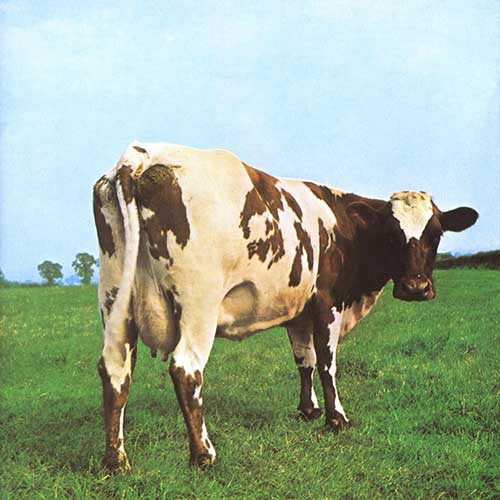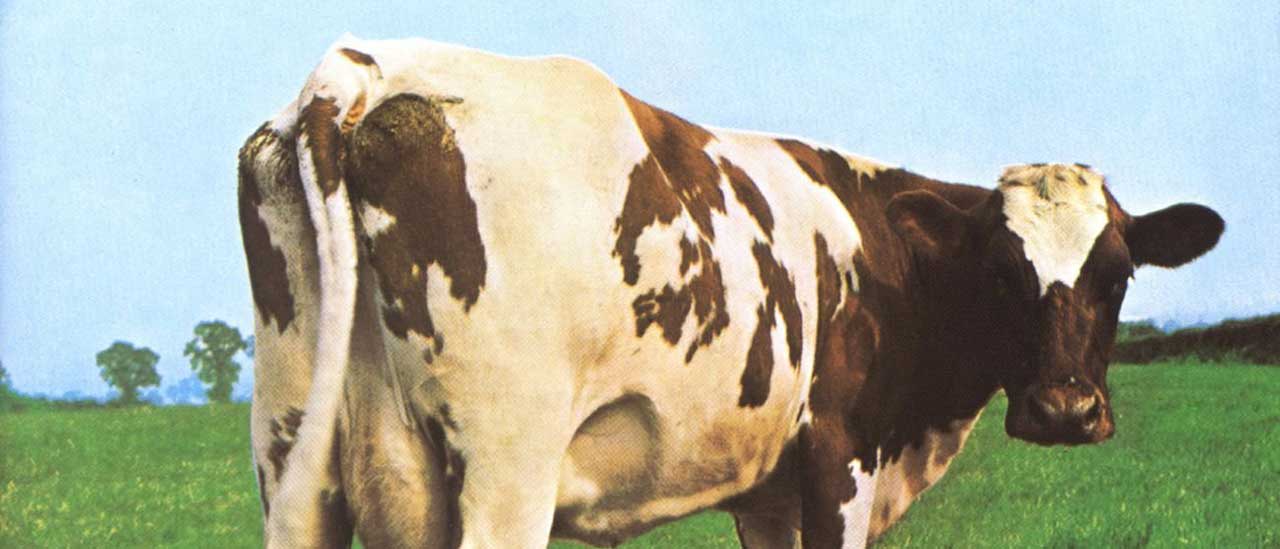You can trust Louder

1. Atom Heart Mother Suite
a. Father's Shout
b. Breast Milky
c. Mother Fore
d. Funky Dung
e. Mind Your Throats Please
f. Remergence
2. If
3. Summer '68
4. Fat Old Sun
5. Alan's Psychedelic Breakfast
a. Rise and Shine
b. Sunny Side Up
c. Morning Glory
David Gilmour described Pink Floyd’s 1970 album Atom Heart Mother as “a load of rubbish... we were scraping the barrel a bit at that period.”
His bandmate, Roger Waters, was no less harsh, later stating that if anyone was foolish enough to ask him to perform it now, he would tell them unequivocally: “You must be fucking joking."
And yet the album that Pink Floyd’s two main protagonists at the time were so quick to dismiss was a landmark on many levels: the first British ‘rock’ album to feature one track covering an entire side of vinyl; the first to appear without any indication on the sleeve of who the group was or what the album was called, or indeed any information whatsoever; the first Floyd album to feature an outside writer (Ron Geesin, who co-wrote the monumental 23-minute title track); the first Floyd album to be specially mixed for four-channel quadraphonic sound as well as conventional two-channel stereo; and, despite all this, the first Floyd album to go to No.1 in the UK chart.
Atom Heart Mother marked the moment that Pink Floyd came in from the cold of their post-Barrett malaise and found the way forward, towards everything we now remember them best for. Not simple pop-psychedelia, nor mere prog showmanship, but a clearly thought-out, if occasionally wavering, attempt at something that could neither be categorised as rock, nor classical, nor indeed anything else outside of what it is: its own faltering, frustrating, enticing, fundamentally flawed yet gloriously individualistic musical form.
And while side two of the album comprised three five-minute tracks, each written by one member, culminating in a final ‘suite’ of sound effects largely concocted by Nick Mason, it was the title track – co-written with the aforementioned Scottish avant-garde musician and composer Ron Geesin – that finally cemented Floyd’s burgeoning reputation as creators of both art and music.
Every week, Album of the Week Club listens to and discusses the album in question, votes on how good it is, and publishes our findings, with the aim of giving people reliable reviews and the wider rock community the chance to contribute.
Sign up below to get the latest from Classic Rock, plus exclusive special offers, direct to your inbox!

Background
An album that ended with a cow in a field in Potters Bar, Hertfordshire, began over a year before in Rome. Italian director Michelangelo Antonioni had commissioned Pink Floyd to score his next film, Zabriskie Point. They arrived in Rome to start recording in November ’69.
The early Pink Floyd had embraced the unexpected and the concept of being, as drummer Nick Mason put it, “more than just a pop group”. They’d stopped releasing singles after December 1968 and had followed their second album, that year’s A Saucerful Of Secrets, with a soundtrack for the art house movie More.
Zabriskie Point was the next stage on Floyd’s varied musical journey, but the band quickly discovered that Antonioni was an impossible taskmaster. “We did some great stuff,” insisted Waters. However, the director, worried their music would overpower his movie, criticised everything: “You’d change whatever was wrong and he’d still be unhappy. It was hell.”
Floyd lasted two weeks in Rome and then came home. Zabriskie Point appeared in February 1970 and was a resounding flop. The soundtrack included just three Floyd tracks, padded out with songs by the Grateful Dead, among others. However, Floyd’s discarded outtakes contained a musical sequence around which the Atom Heart Mother suite would evolve.

Other albums released in October 1970
- On the Boards - Taste
- Stone the Crows - Stone the Crows
- The Madcap Laughs - Syd Barrett
- Magic Christian Music - Badfinger
- A Song for Me - Family
- Bridge over Troubled Water - Simon & Garfunkel
- Chicago Chicago aka Chicago II
- Moondance - Van Morrison
- American Woman - The Guess Who
- Argent - Argent

What they said...
"Side one is a suite, almost a symphony. It has a lot in it. They use orchestral elements and a choir. The best that can be said for it is that it’s craftsman-like and that in spite of its many parts, it’s an entity. But that’s all. As Impressionism, it’s occasionally effective, but on a very imitative level. The beginning does sound sunrisey. And, there are sounds that draw pictures. But, as a whole it’s awful schmaltzy and a little vapid. Side two is generally worse. If is English folk at its deadly worst. It’s soft and silly. Ditto Fat Old Sun." (Rolling Stone)
"There are interesting moments scattered throughout the record, and the work that initially seems so impenetrable winds up being Atom Heart Mother's strongest moment. That it lasts an entire side illustrates that Pink Floyd was getting better with the larger picture instead of the details, since the second side just winds up falling off the tracks, no matter how many good moments there are. This lack of focus means Atom Heart Mother will largely be for cultists, but its unevenness means there's also a lot to cherish here." (AllMusic)
"Atom Heart Mother is a very mellow album at its core, and it is a tough album to penetrate, so many people just skip over it or dismiss the album completely, but I think that is a mistake. Although it is mellow and unpolished, it is important to recognize that it is the first Pink Floyd album that contains all the key elements that would create their signature sound, so its place in the evolution of Pink Floyd is unparalleled and the album should not be overlooked. (Music Banter)

What you said...
David Heaton: Ahh. The Back Side Of The Moo.
Pekka Turunen: It took them a while to get over Syd and find their own voice. On this album I don't think the execution of their ideas was quite up to par yet with their ambition. The title track has good ideas and parts, but goes on meandering for longer than it should, and Alan's Psychedelic Breakfast is all about the experiment with very little enjoyable music to show for it.
But the three small songs in the middle are all pretty great, one for each writer. Back when I was getting into Floyd I dreamt of an album that had the opening and closing tracks of Meddle and the middle tracks of AHM, that would make a pretty flawless whole.
Scott Spalding: I know people dog on the [opening] suite, it's too long, too indulgent, yadda friggin' yadda. That's what I love about it. The orchestra, the chorus, the horns, the goofy pretentiousness of it all. I don't consider it pretentious, unless you say they are pretending that they'd like to try something different.
Then we get into three great, really enjoyable songs, one by each of the main writers of the group, which someone has mentioned here before. Each one is easily among the best songs of each writer. From a historical perspective, would the 3 of them ever share vinyl space so easily again? Not with Roger's increasing domination of all things Pink during their classic era. Heavy sigh's here.
First we get Roger expressing a rare bit of humility and... Is that contriteness? A lovely song. If only he had a smidge of that grace nowadays.
The first time I heard Summer '68, only about 15 years ago, I was taken aback that the legendary Floyd had made a song with such subdued and subtle charms. Was this the same band that raged against the wall? That consigned all of humanity to Orwellian animals? I came back to this many times, often just playing the one song on the entire LP, wondering why I dawdled so long to get into pre-DSOTM PF. My bad.
Then David's Fat Old Sun, which is so well-crafted it's good enough to be in his modern setlist. Three winners in a row.
The less said about Alan's Unappetizing Breakfast, the better.
Hugh Lynch: In 1970 I was 17 and opening up to new sounds in music: I was fascinated by sound collage, having heard Revolution 9 on the Beatles' White Album, intrigued by Soft Machine's performance (and the Terry Riley piece that preceded it) at the BBC Proms that summer and astounded by the vocal stuff on the 2001 soundtrack. Then comes, at the end of that year, Atom Heart Mother which seemed to bring together so many of those elements for me.
A schoolfriend bought it and we would listen to it over and over at his house or in the 6th Form Lounge at school (where the real music-heads hung out). I realise it can be seen as a formative record by a band searching for something which received wisdom states they 'got' on DSOTM, and that is a fair-enough assessment. But that relegates this wonderfully inventive record to being a mere stepping stone: it is a sombre yet satisfying experience for this listener, music created by young guys excited about the new sounds they are hearing around them.
Side Two is no less enjoyable for me, three songs and a piece which puts an amusing and reflective full stop to the kind of thing they were doing on the second Umma Gumma disc and in some of their live work (check out the bootleg of the 1969 Amsterdam concert, a one-off, where they give themselves over to this kind of experimentation completely).
Listening now, I find it still a very fulfilling experience, reminded of the tingle I got back then at those moments where things converge out of sonic chaos. I wish the drums had been recorded better, but we cannot have it all: it is what it is, and I love it for itself, not merely for its part in the band's progress.
Hai Kixmiller: The opening song is nothing but musical psychobabble. Sure, it sounds like music but it goes nowhere. There's no direction, no story, it's like flicking through your T.V. channels at 2am, there's nothing on but crap. I've had dental visits that were shorter and less painful then the title track.
If is lyrically the most interesting song on the album. My takeaway is that it's about a love sick man bemoaning his decisions, and his inadequacies. It's also very clear to see the influence ex-bandmate Syd Barrett had on Roger Waters. A boring melody, but the lyrics had me coming back to this song for several listenings.
Summer '68, Rick Wright got laid, wrote a song about it... NEXT!
Fat Old Sun, David Gilmore's opus to pastures, fields, and parks. Boring! If I want to listen to music about parks, people, and summer I'll dig out my Chicago albums.
I'm not even gonna go into Alan's Psychedelic Breakfast. It's 13 minutes of your life that you can't get back.
Didn't much care for this album. But the proverbial "writing on the wall" is all there. One can sense the greatness to come.
Dominic Grierson: I always feel like Post Piper/Pre Dark Side Pink Floyd is like that awful abyss between Christmas and New Year: full of directionless excess and a feeling of not knowing what day it is or where you really are. Perhaps a more vulgar analogy would to call it the Pink Floyd Perineum (PFP) though that might prompt further debate about which part you assign each era.
I bought this album on vinyl second hand in the late nineties, I did listen to it a lot as I did other PFP albums at that time in my life - my favourites being Obscured By Clouds and Meddle. The Live at Pompeii VHS tape was also a favourite. I like the main suite, not that keen on the Wright song Summer 68, the Gilmour song Fat Old Sun is enjoyable and still sounds fresh, If shows Waters improving as a songwriter. As for the mess that is the final track... less said, best mended.
I love the cover art. On the whole I think it's good in parts but lacks the childlike invention of Barrett's work or the assured cynicism of the band when Waters grabbed them by the scruff of the neck and made them ask questions of more substance.

Final Score: 6.49 ⁄10 (245 votes cast, with a total score of 1592)
Join the Album Of The Week Club on Facebook to join in. The history of rock, one album at a time.
Classic Rock is the online home of the world's best rock'n'roll magazine. We bring you breaking news, exclusive interviews and behind-the-scenes features, as well as unrivalled access to the biggest names in rock music; from Led Zeppelin to Deep Purple, Guns N’ Roses to the Rolling Stones, AC/DC to the Sex Pistols, and everything in between. Our expert writers bring you the very best on established and emerging bands plus everything you need to know about the mightiest new music releases.


